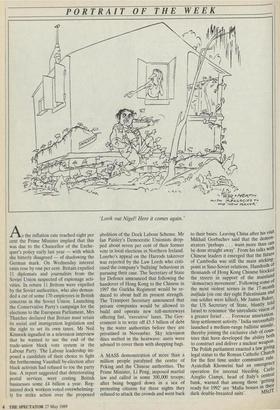PORTRAIT OF THE WEEK
`Look out Nigel! Here it comes again.'
As the inflation rate reached eight per cent the Prime Minister implied that this was due to the Chancellor of the Exche- quer's policy early last year — with which she bitterly disagreed — of shadowing the German mark. On Wednesday interest rates rose by one per cent. Britain expelled 11 diplomats and journalists from the Soviet Union suspected of espionage acti- vities. In return 11 Britons were expelled by the Soviet authorities, who also deman- ded a cut of some 170 employees in British concerns in the Soviet Union. Launching the Conservative Party's campaign for the elections to the European Parliament, Mrs Thatcher declared that Britain must retain its social and immigration legislation and the right to set its own taxes. Mr Neil Kinnock signalled in a television interview that he wanted to see the end of the trade-union block vote system in the Labour Party. The Labour leadership im- posed a candidate of their choice to fight the forthcoming Vauxhall by-election after black activists had refused to toe the party line. A report suggested that deteriorating postal services were costing British businesses some £4 billion a year. Reg- istered dock workers voted overwhelming- ly for strike action over the proposed abolition of the Dock Labour Scheme. Mr Ian Paisley's Democratic Unionists drop- ped about seven per cent of their former vote in local elections in Northern Ireland. Lonrho's appeal on the Harrods takeover was rejected by the Law Lords who criti- cised the company's 'bullying' behaviour in pursuing their case. The Secretary of State for Defence announced that following the handover of Hong Kong to the Chinese in 1997 the Gurkha Regiment would be re- duced to about half its present strength. The Transport Secretary announced that private companies would be allowed to build and operate new toll-motorways offering fast, 'executive' lanes. The Gov- ernment is to write off £5.5 billion of debt by the water authorities before they are privatised in November. Sky television discs melted in the heatwave: users were advised to cover them with shopping bags.
A MASS demonstration of more than a million people paralysed the centre of Peking and the Chinese authorities. The Prime Minister, Li Peng, imposed martial law and called in some 300,000 troops; after being bogged down in a sea of protesting citizens fot three nights they refused to attack the crowds and went back to their bases. Leaving China after his visit Mikhail Gorbachev said that the demon- strators 'perhaps . . . want more than end be done straight away'. From his talks With Chinese leaders it emerged that the future of Cambodia was still the main sticking- point in Sino-Soviet relations. Hundreds of thousands of Hong Kong Chinese blocked the streets in support of the mainland `democracy movement'. Following some of the most violent scenes in the 17-month intifada (on one day eight Palestinians and one soldier were killed), Mr James Baker, the US Secretary of State, bluntly told Israel to renounce 'the unrealistic vision of a greater Israel . . . Forswear annexation. Stop settlement activity.' India succesSfullY launched a medium-range ballistic missile, thereby joining the exclusive club of coun- tries that have developed the ability both to construct and deliver a nuclear weapon: The Polish parliament enacted a law giving legal status to the Roman Catholic Church for the first time under communist rule. Ayatollah Khomeini had an emergency operation for internal bleeding. Carlo Azeglio Ciampi, head of Italy's central bank, warned that among those 'getting ready for 1992' are 'Mafia bosses in their dark double-breasted suits'. MStrr


















































 Previous page
Previous page